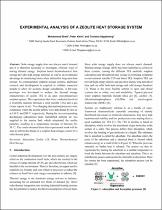JavaScript is disabled for your browser. Some features of this site may not work without it.
- ResearchSpace
- →
- Research Publications/Outputs
- →
- Conference Publications
- →
- View Item
| dc.contributor.author |
Sheik, Muhammed

|
|
| dc.contributor.author |
Klein, Peter

|
|
| dc.contributor.author |
Segakweng, Tshiamo

|
|
| dc.date.accessioned | 2022-03-04T08:24:55Z | |
| dc.date.available | 2022-03-04T08:24:55Z | |
| dc.date.issued | 2021-11 | |
| dc.identifier.citation | Sheik, M., Klein, P. & Segakweng, T. 2021. Experimental analysis of a zeolite heat storage system. http://hdl.handle.net/10204/12298 . | en_ZA |
| dc.identifier.isbn | 978-0-7972-1878-9 | |
| dc.identifier.uri | http://hdl.handle.net/10204/12298 | |
| dc.description.abstract | Solar energy supply does not always match demand and it is therefore necessary to investigate efficient ways of storing thermal energy. Sorption based thermochemical heat storage provides high energy densities as well as an exceptional advantage in minimizing losses when utilised for long-term heat storage. To commercialize sorption storage systems, additional research and development is required to validate numerical models to allow for accurate design calculations. A lab-scale prototype was developed to analyse the thermal storage characteristics of zeolite 13X in an open (non-pressurised) sorption system. The experiments that were conducted involved a reversible reaction between a solid (zeolite 13X) and a gas (water vapour in air). Two charging (desorption) processes were conducted, where the zeolite pellets were dehydrated by hot air at 130 oC and 200 oC respectively. During the two corresponding discharging (adsorption) tests, humidified ambient air was supplied to the reactor bed, which rehydrated the zeolite particles, resulting in a temperature increase of between 28- 38 oC. The results obtained from this experimental work will be used to inform the design of a sorption heat storage system for a solar thermal plant. | en_US |
| dc.format | Fulltext | en_US |
| dc.language.iso | en | en_US |
| dc.relation.uri | https://sasec.org.za/documents/SASEC_2021_Conference_Proceedings.pdf | en_US |
| dc.source | Southern African Sustainable Energy Conference, Lanzerac Wine Estate, Western Cape, South Africa, 17-19 November 2021 | en_US |
| dc.subject | Adsorption | en_US |
| dc.subject | Zeolite 13X | en_US |
| dc.subject | Thermochemical heat storage | en_US |
| dc.subject | Solar energy supply | en_US |
| dc.title | Experimental analysis of a zeolite heat storage system | en_US |
| dc.type | Conference Presentation | en_US |
| dc.description.pages | 43-49 | en_US |
| dc.description.note | Paper presented at the Southern African Sustainable Energy Conference, Lanzerac Wine Estate, Western Cape, South Africa, 17-19 November 2021 | en_US |
| dc.description.cluster | Smart Places | en_US |
| dc.description.impactarea | Energy Supply and Demand | en_US |
| dc.identifier.apacitation | Sheik, M., Klein, P., & Segakweng, T. (2021). Experimental analysis of a zeolite heat storage system. http://hdl.handle.net/10204/12298 | en_ZA |
| dc.identifier.chicagocitation | Sheik, Muhammed, Peter Klein, and Tshiamo Segakweng. "Experimental analysis of a zeolite heat storage system." <i>Southern African Sustainable Energy Conference, Lanzerac Wine Estate, Western Cape, South Africa, 17-19 November 2021</i> (2021): http://hdl.handle.net/10204/12298 | en_ZA |
| dc.identifier.vancouvercitation | Sheik M, Klein P, Segakweng T, Experimental analysis of a zeolite heat storage system; 2021. http://hdl.handle.net/10204/12298 . | en_ZA |
| dc.identifier.ris | TY - Conference Presentation AU - Sheik, Muhammed AU - Klein, Peter AU - Segakweng, Tshiamo AB - Solar energy supply does not always match demand and it is therefore necessary to investigate efficient ways of storing thermal energy. Sorption based thermochemical heat storage provides high energy densities as well as an exceptional advantage in minimizing losses when utilised for long-term heat storage. To commercialize sorption storage systems, additional research and development is required to validate numerical models to allow for accurate design calculations. A lab-scale prototype was developed to analyse the thermal storage characteristics of zeolite 13X in an open (non-pressurised) sorption system. The experiments that were conducted involved a reversible reaction between a solid (zeolite 13X) and a gas (water vapour in air). Two charging (desorption) processes were conducted, where the zeolite pellets were dehydrated by hot air at 130 oC and 200 oC respectively. During the two corresponding discharging (adsorption) tests, humidified ambient air was supplied to the reactor bed, which rehydrated the zeolite particles, resulting in a temperature increase of between 28- 38 oC. The results obtained from this experimental work will be used to inform the design of a sorption heat storage system for a solar thermal plant. DA - 2021-11 DB - ResearchSpace DP - CSIR J1 - Southern African Sustainable Energy Conference, Lanzerac Wine Estate, Western Cape, South Africa, 17-19 November 2021 KW - Adsorption KW - Zeolite 13X KW - Thermochemical heat storage KW - Solar energy supply LK - https://researchspace.csir.co.za PY - 2021 SM - 978-0-7972-1878-9 T1 - Experimental analysis of a zeolite heat storage system TI - Experimental analysis of a zeolite heat storage system UR - http://hdl.handle.net/10204/12298 ER - | en_ZA |
| dc.identifier.worklist | 25451 | en_US |






